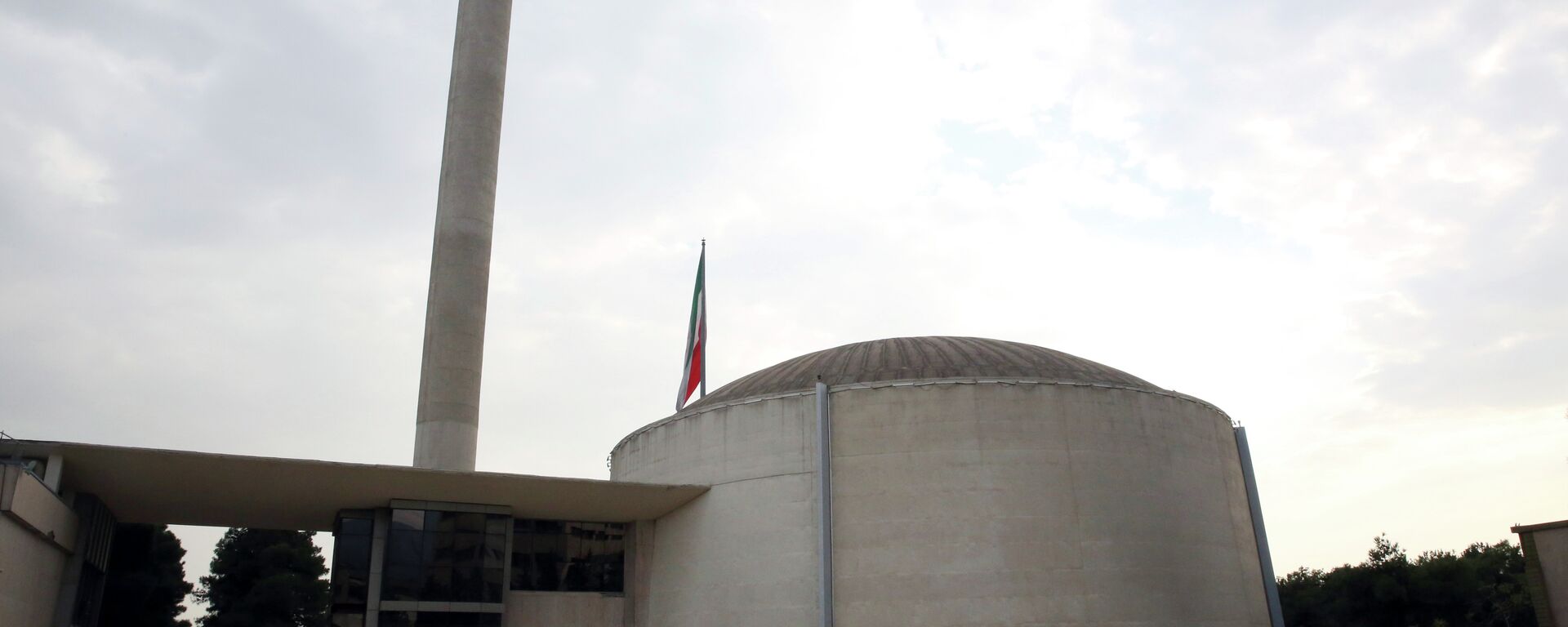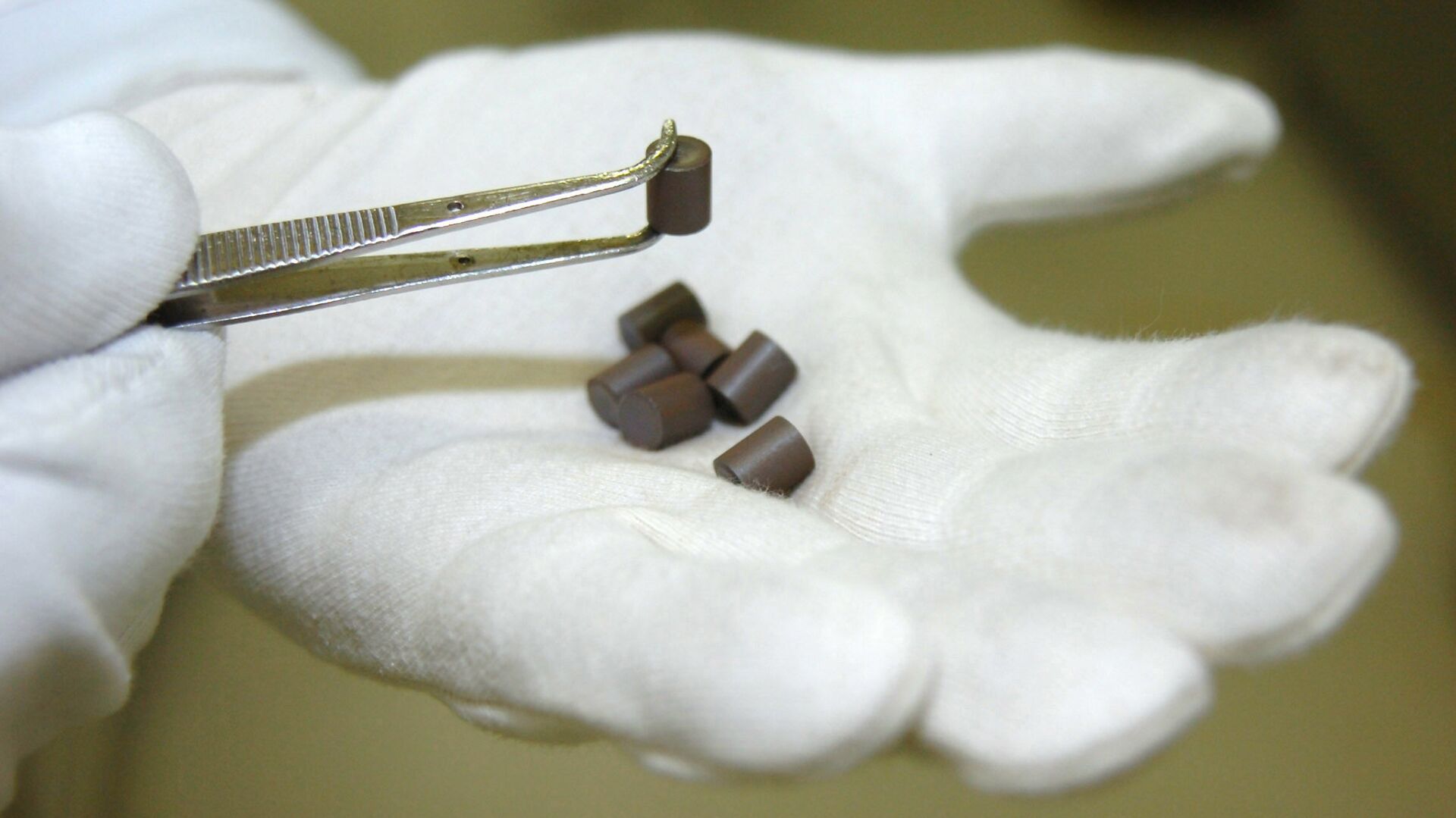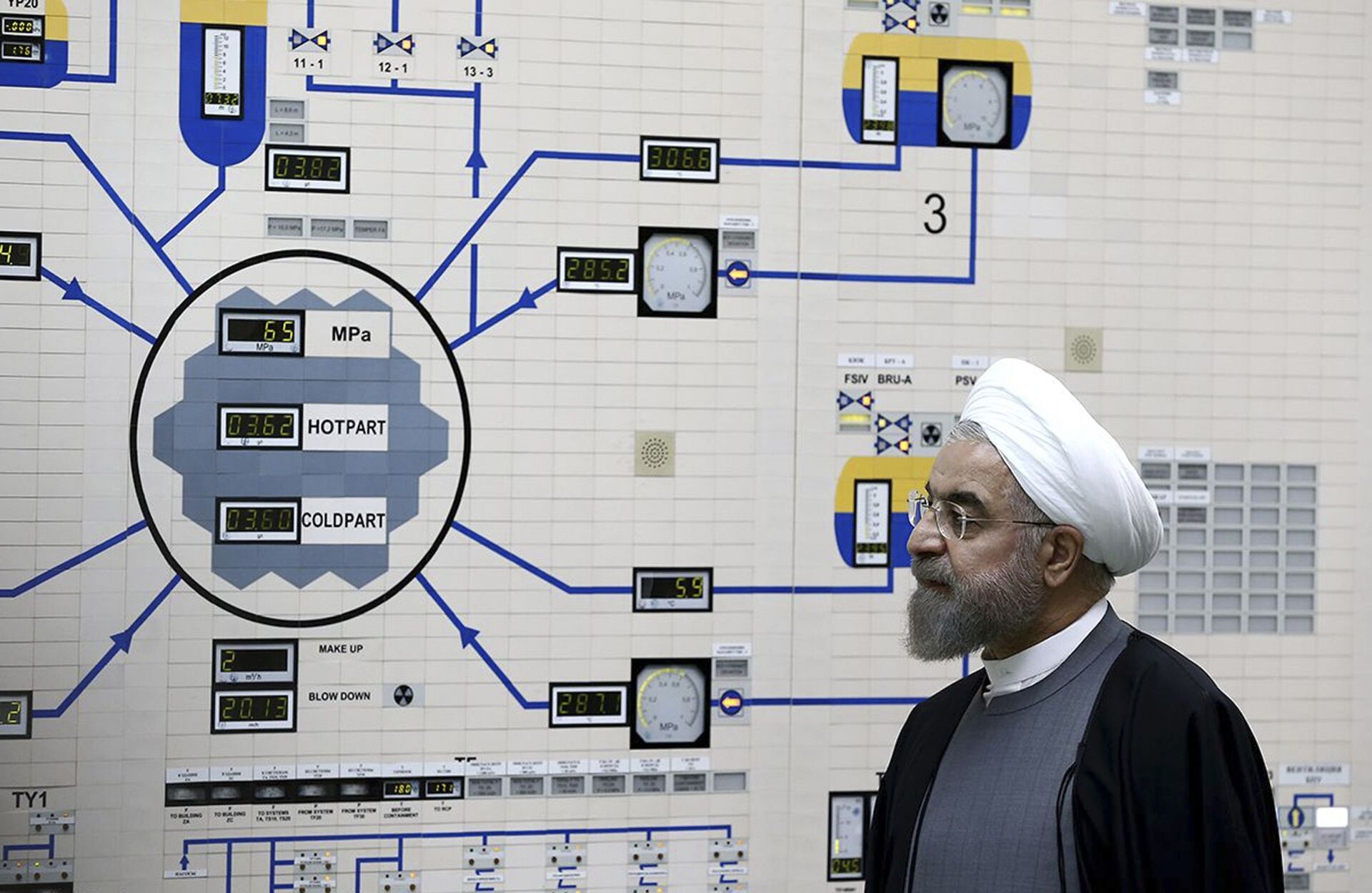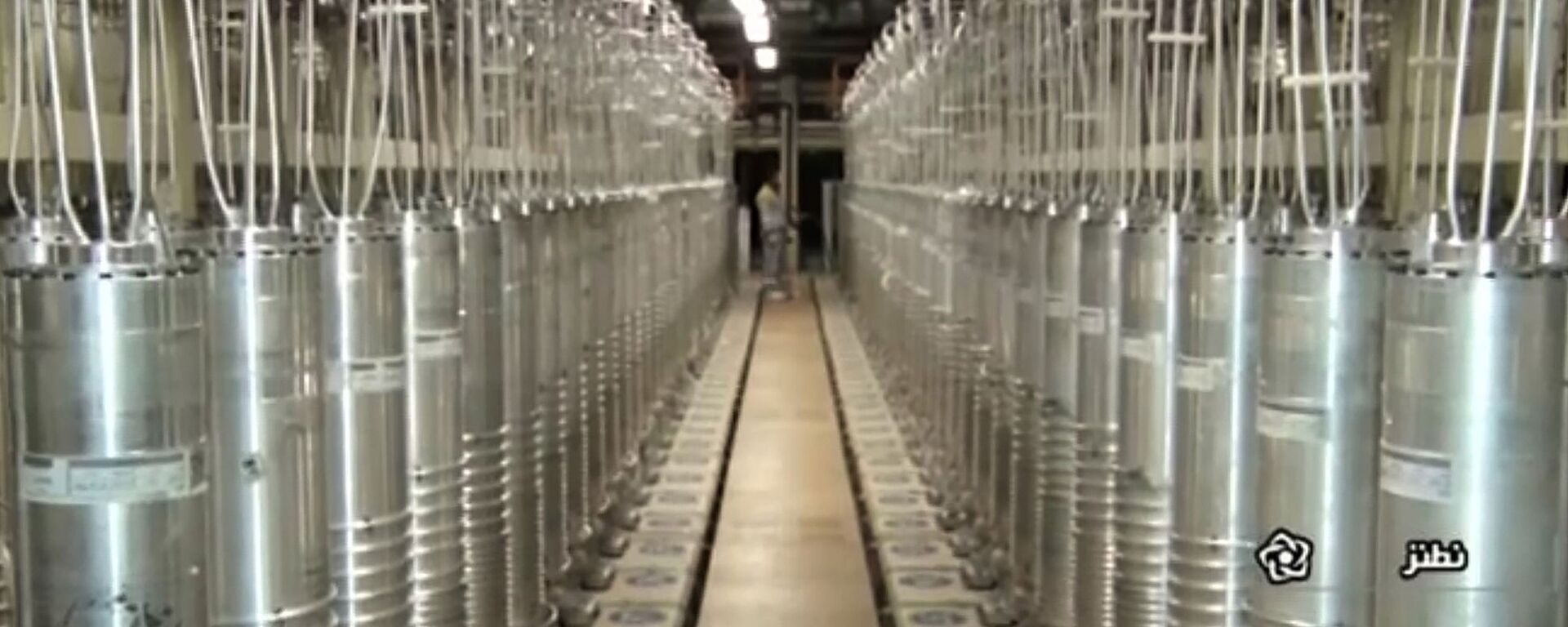https://sputnikglobe.com/20211003/exclusive-tehran-to-boost-uranium-enrichment-head-of-irans-atomic-energy-organisation-says-1089603710.html
EXCLUSIVE: Tehran to Boost Uranium Enrichment, Head of Iran's Atomic Energy Organisation Says
EXCLUSIVE: Tehran to Boost Uranium Enrichment, Head of Iran's Atomic Energy Organisation Says
Sputnik International
Iranian authorities have repeatedly stressed that the country has never pursued nuclear weapons and never will, despite its decision to boost uranium... 03.10.2021, Sputnik International
2021-10-03T04:58+0000
2021-10-03T04:58+0000
2021-10-03T04:58+0000
world
middle east
iran
nuclear technology
jcpoa
interviews
https://cdn1.img.sputnikglobe.com/img/07e4/0c/02/1081335000_0:199:2283:1483_1920x0_80_0_0_69de8266cb09d2a01a4af7e61d969870.jpg
In an exclusive interview with Sputnik Iran, Mohammad Eslami, vice president and the head of the Atomic Energy Organisation of the Islamic Republic of Iran (AEOI), explained what the recent conflict with the IAEA was about, why Iran considered the report on access to monitoring cameras at the TESA Complex in Karaj unconstructive, and more.Vice President Eslami has refuted information that a large number of uranium particles of man-made origin was found at three sites in Iran, which had not been reported to the IAEA. He also stressed that Tehran will continue to enrich uranium, but will never use it to develop nuclear weapons.Sputnik: Having been appointed head of the Atomic Energy Organisation of the Islamic Republic of Iran (AEOI), what areas or directions have you identified as the priority ones that need to be changed?Mohammad Eslami: Iran is now facing an acute need for electricity. Therefore, we have set a goal to meet 50 percent of the country's demand for 10,000-16,000 MW of electricity by building new [nuclear] power plants with a combined capacity of 8,000 MW. This is currently the principal objective of the Atomic Energy Organisation of Iran. The second priority of the organisation is to develop the production of radiopharmaceuticals and the development of radiotracer generators. Today, these nuclear power products should be actively introduced in our country in medicine, industry, agriculture, and the environment.Sputnik: Do you believe any country should have access to and be able to produce nuclear energy?Mohammad Eslami: Of course, all countries have the full right to use advanced nuclear technologies. This right is enshrined in the Statute of the IAEA. Moreover, the IAEA should encourage countries to develop nuclear power projects and help states with the necessary expertise and even technology. According to its statute, the IAEA should provide comprehensive support and assistance to all countries both in training and in research areas for the development of peaceful nuclear energy. Of course, this applies primarily to countries where there is normal stable economic development, where there are no military conflicts, and where there is democracy and the rule of the people.Sputnik: In your view, how has Iran's nuclear power changed? What has it done for the country? For many years, Iran's nuclear programme has been in the news almost exclusively in a negative light.Mohammad Eslami: For almost 40 years, Iran's progress in every sphere has faced unfair and harsh criticism from the West. This is not just about nuclear power. They [the West] cannot allow other countries to have access to advanced technologies in energy. In their view, all advances and discoveries in this field should be exclusively under their banner and control. Iran is a rich country, not only with natural resources but also with enormous human potential. This has allowed Iran to fully localise knowledge on the development of the peaceful atom, develop nuclear technology on its own, and establish its own scientific training base in nuclear energy. The country was able to build its first nuclear power plant with the participation of Russian specialists, that is, to attract attention for foreign investment in this area, to reach a self-sufficient level of peaceful nuclear energy to meet the needs of the country's population, both in fuel and in radioisotopes and the development of nuclear medicine. At the same time, Iran has been a member of the IAEA for 50 years and during this time only our country has been subjected to various attacks and captious criticism on nuclear energy.Sputnik: What are Iran's plans for nuclear power development? Do you plan to increase uranium enrichment capacity? What level of enriched uranium is Iran planning to reach?Mohammad Eslami: Iran will operate within the framework of the International Treaty (NPT), of which it is a member. Iran pledges not to develop or proliferate nuclear weapons. Iran is committed to the Treaty on the Non-Proliferation of Nuclear Weapons. Moreover, under the law of the Islamic Republic and the fatwa of Iran's supreme leader, the development of nuclear weapons is prohibited. Therefore, our nuclear programme is exclusively peaceful, and we will enrich uranium in a way to avoid crossing the permissible level (the threshold value of uranium enrichment for military purposes [creation of nuclear weapons] is 90 percent – ed. note Sputnik).Sputnik: IAEA Director General Rafael Mariano Grossi recently submitted a report stating that Iran had denied IAEA inspectors access to surveillance cameras at a nuclear facility in Karaj. Why did Iran call the report false and unconstructive?Mohammad Eslami: Under the NPT, as well as under the Comprehensive Safeguards Agreement (CSA), IAEA inspectors have been monitoring for many years – in person and using surveillance cameras. This is done not only at sites in Iran but also in other NPT countries, in accordance with the IAEA Statute. Unfortunately, states that are hostile to us are deliberately and illegitimately politicising this process, it is a form of discrimination. Iran has so far shown the utmost restraint to maintain its credibility.First, under the CSA, IAEA inspectors continue to monitor nuclear facilities in Iran. We have no problem or disagreement with them on this matter. Secondly, the range of surveillance cameras to which the IAEA must have access at certain sites is fixed in the JCPOA. All these cameras were installed at the sites by IAEA inspectors. In fact, this was a deal between Iran and the P5+1. Iran has shown a sign of goodwill in return for the other side fulfilling its obligations: lifting all designated sanctions, allowing Iran to develop advanced technologies to meet its needs, including in nuclear energy. However, these commitments have not been fulfilled by the US and European countries. According to the deal, Iran has met the conditions for reducing nuclear activities at a number of sites. The cameras were installed to monitor this process. Two and a half years have passed and the other side of the deal still has not fulfilled its obligations. Iran, however, has absolutely voluntarily accepted the Additional Protocol to the NPT and hosted IAEA inspectors so as not to undermine its credibility.One has to wonder to what extent a party that has re-sanctioned us, failed to meet its obligations, withdrawn from the deal, imposed sanctions even on those who are cooperating with us, has the right to demand additional monitoring inspections on our compliance with obligations.As for the Karaj nuclear facility, it should be recalled that it was the site of a terrorist attack and was destroyed in an explosion. It is regrettable that neither the IAEA nor the countries that have made monitoring claims against us condemned that terrorist act. An investigation by judicial and law enforcement bodies is underway at this site. The IAEA representatives were told about these important details in both Tehran and Vienna: the facility was severely destroyed, in particular where the cameras were supposed to be located. Not condemning a terrorist act at an official site under IAEA supervision is tantamount to supporting terrorists.Sputnik: Can you comment on the IAEA director general's statements that a large number of man-made uranium particles were found in Iran's territory at three sites that were not reported to the IAEA?Eslami: Unfortunately, this false news is actively being promoted by members of a terrorist group who are now taking refuge in European countries (the People's Mujahedin Organisation of Iran, or the Mujahedin-e-Khalq – ed. note). They keep trying to present some fake documents, allegedly satellite photos, the authenticity of which is not confirmed. The photos were taken in the 1990s but they are presented as recent ones. The IAEA, as an international body, should not fall for these tricks and become a puppet in the hands of this terrorist group.Sputnik: Iran and Russia have a long history of cooperation on nuclear energy. What are the main topics on the agenda?Eslami: The most important subjects are the Bushehr NPP project, which consists of 3 units. Unit 1 has already entered, so to speak, an independent production cycle. Now, we have a new maintenance contract for the other two units with a capacity of 1,700 MW on the agenda.
https://sputnikglobe.com/20210930/irans-nuclear-chief-says-june-sabotage-inflicted-severe-damage-on-karaj-facility-1089554371.html
https://sputnikglobe.com/20210714/iranian-president-rouhani-reveals-when-tehran-can-produce-90-uranium--1083382892.html
iran
Sputnik International
feedback@sputniknews.com
+74956456601
MIA „Rosiya Segodnya“
2021
Sputnik International
feedback@sputniknews.com
+74956456601
MIA „Rosiya Segodnya“
News
en_EN
Sputnik International
feedback@sputniknews.com
+74956456601
MIA „Rosiya Segodnya“
Sputnik International
feedback@sputniknews.com
+74956456601
MIA „Rosiya Segodnya“
middle east, iran, nuclear technology, jcpoa, interviews
middle east, iran, nuclear technology, jcpoa, interviews
EXCLUSIVE: Tehran to Boost Uranium Enrichment, Head of Iran's Atomic Energy Organisation Says
Iranian authorities have repeatedly stressed that the country has never pursued nuclear weapons and never will, despite its decision to boost uranium enrichment. Under the 2015 nuclear deal, Iran was allowed to enrich uranium up to 3.67 percent, but Tehran rolled back its commitment due to the unilateral US withdrawal from the accord in May 2018.
In an exclusive interview with Sputnik Iran, Mohammad Eslami, vice president and the head of the Atomic Energy Organisation of the Islamic Republic of Iran (AEOI), explained what the recent conflict with the IAEA was about, why Iran considered the report on access to monitoring cameras at the TESA Complex in Karaj unconstructive, and more.
Vice President Eslami has refuted information that a large number of uranium particles of man-made origin was found at three sites in Iran, which had not been reported to the IAEA. He also stressed that Tehran will continue to enrich uranium, but will never use it to develop nuclear weapons.
Sputnik: Having been appointed head of the Atomic Energy Organisation of the Islamic Republic of Iran (AEOI), what areas or directions have you identified as the priority ones that need to be changed?
Mohammad Eslami: Iran is now facing an acute need for electricity. Therefore, we have set a goal to meet 50 percent of the country's demand for 10,000-16,000 MW of electricity by building new [nuclear] power plants with a combined capacity of 8,000 MW. This is currently the principal objective of the Atomic Energy Organisation of Iran. The second priority of the organisation is to develop the production of
radiopharmaceuticals and the development of radiotracer generators. Today, these nuclear power products should be actively introduced in our country in medicine, industry, agriculture, and the environment.
Sputnik: Do you believe any country should have access to and be able to produce nuclear energy?
Mohammad Eslami: Of course, all countries have the full right to use advanced nuclear technologies. This right is enshrined in the Statute of the IAEA. Moreover, the IAEA should encourage countries to develop nuclear power projects and help states with the necessary expertise and even technology. According to its statute, the IAEA should provide comprehensive support and assistance to all countries both in training and in research areas for the development of
peaceful nuclear energy. Of course, this applies primarily to countries where there is normal stable economic development, where there are no military conflicts, and where there is democracy and the rule of the people.
Sputnik: In your view, how has Iran's nuclear power changed? What has it done for the country? For many years, Iran's nuclear programme has been in the news almost exclusively in a negative light.
Mohammad Eslami: For almost 40 years, Iran's progress in every sphere has faced unfair and
harsh criticism from the West. This is not just about nuclear power. They [the West] cannot allow other countries to have access to advanced technologies in energy. In their view, all advances and discoveries in this field should be exclusively under their banner and control. Iran is a rich country, not only with natural resources but also with enormous human potential. This has allowed Iran to fully localise knowledge on the development of the peaceful atom, develop nuclear technology on its own, and establish its own scientific training base in nuclear energy.

30 September 2021, 15:27 GMT
The country was able to build its first nuclear power plant with the participation of Russian specialists, that is, to attract attention for foreign investment in this area, to reach a self-sufficient level of peaceful nuclear energy to meet the needs of the country's population, both in fuel and in radioisotopes and the development of nuclear medicine. At the same time, Iran has been a member of the IAEA for 50 years and during this time only our country has been subjected to various attacks and captious criticism on nuclear energy.
Sputnik: What are Iran's plans for nuclear power development? Do you plan to increase uranium enrichment capacity? What level of enriched uranium is Iran planning to reach?
Mohammad Eslami: Iran will operate within the framework of the International Treaty (NPT), of which it is a member. Iran pledges not to develop or proliferate nuclear weapons. Iran is committed to the Treaty on the Non-Proliferation of Nuclear Weapons. Moreover, under the law of the Islamic Republic and the fatwa of Iran's supreme leader, the development of nuclear weapons is prohibited. Therefore, our nuclear programme is exclusively peaceful, and we will enrich uranium in a way to avoid crossing the permissible level (the threshold value of uranium enrichment for military purposes [creation of nuclear weapons] is 90 percent – ed. note Sputnik).
Sputnik: IAEA Director General Rafael Mariano Grossi recently submitted a report stating that Iran had denied IAEA inspectors access to surveillance cameras at a nuclear facility in Karaj. Why did Iran call the report false and unconstructive? Mohammad Eslami: Under the NPT, as well as under the Comprehensive Safeguards Agreement (CSA), IAEA inspectors have been monitoring for many years – in person and using surveillance cameras. This is done not only at sites in Iran but also in other NPT countries, in accordance with the IAEA Statute. Unfortunately, states that are hostile to us are deliberately and illegitimately politicising this process, it is a form of discrimination. Iran has so far shown the utmost restraint to maintain its credibility.
First, under the CSA, IAEA inspectors continue to monitor nuclear facilities in Iran. We have no problem or disagreement with them on this matter. Secondly, the range of surveillance cameras to which the IAEA must have access at certain sites is fixed in the JCPOA. All these cameras were installed at the sites by IAEA inspectors. In fact, this was a deal between Iran and the P5+1. Iran has shown a sign of goodwill in return for the other side fulfilling its obligations: lifting all designated sanctions, allowing Iran to develop advanced technologies to meet its needs, including in nuclear energy.
However, these commitments have not been fulfilled by the US and European countries. According to the deal, Iran has met the conditions for
reducing nuclear activities at a number of sites. The cameras were installed to monitor this process. Two and a half years have passed and the other side of the deal still has not fulfilled its obligations. Iran, however, has absolutely voluntarily accepted the Additional Protocol to the NPT and hosted IAEA inspectors so as not to undermine its credibility.
One has to wonder to what extent a party that has re-sanctioned us, failed to meet its obligations, withdrawn from the deal, imposed sanctions even on those who are cooperating with us, has the right to demand additional monitoring inspections on our compliance with obligations.
Hence, all these accusations against us are unjust and unconstructive. We regret that these forces want to tarnish Iran's image in the eyes of the world. What is even more surprising is that the issue of controlling the transparency of the nuclear programme is being promoted by a country that itself possesses nuclear weapons, a country that is not even a signatory to the NPT.
As for the Karaj nuclear facility, it should be recalled that it was the site of a terrorist attack and was destroyed in an explosion. It is regrettable that neither the IAEA nor the countries that have made monitoring claims against us condemned that terrorist act. An investigation by judicial and law enforcement bodies is underway at this site. The IAEA representatives were told about these important details in both Tehran and Vienna: the facility was severely destroyed, in particular where the cameras were supposed to be located. Not condemning a terrorist act at an official site under IAEA supervision is tantamount to supporting terrorists.
Sputnik: Can you comment on the IAEA director general's statements that a large number of man-made uranium particles were found in Iran's territory at three sites that were not reported to the IAEA?
Eslami: Unfortunately, this false news is actively being promoted by members of a terrorist group who are now taking refuge in European countries (the People's Mujahedin Organisation of Iran, or the Mujahedin-e-Khalq – ed. note). They keep trying to present some fake documents, allegedly satellite photos, the authenticity of which is not confirmed. The photos were taken in the 1990s but they are presented as recent ones. The IAEA, as an international body, should not fall for these tricks and become a puppet in the hands of this terrorist group.
Sputnik: Iran and Russia have a long history of cooperation on nuclear energy. What are the main topics on the agenda?
Eslami: The most important subjects are the Bushehr NPP project, which consists of 3 units. Unit 1 has already entered, so to speak, an independent production cycle. Now, we have a new maintenance contract for the other two units with a capacity of 1,700 MW on the agenda.







